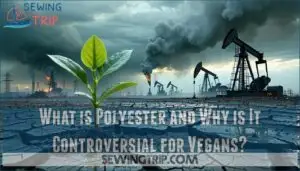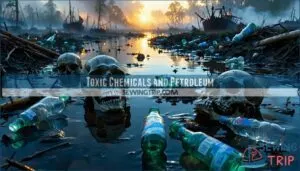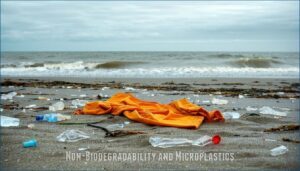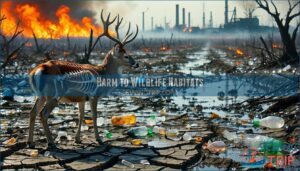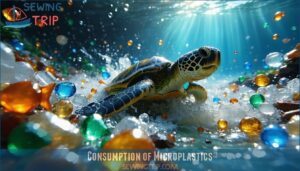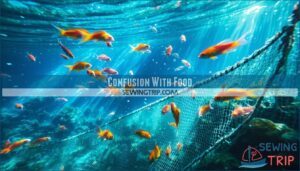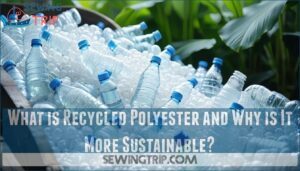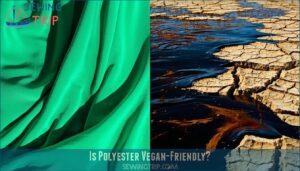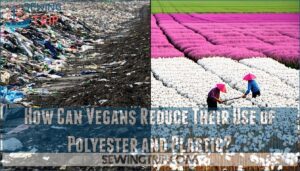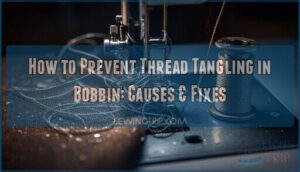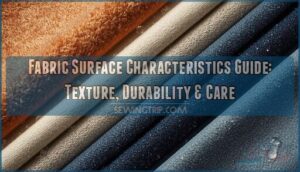This site is supported by our readers. We may earn a commission, at no cost to you, if you purchase through links.
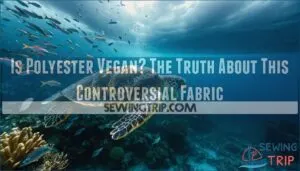
However, it’s a bit of an ethical minefield. While no animals are directly harmed in its production, the fabric has significant environmental impacts.
It sheds microplastics into oceans, polluting habitats and sometimes ending up inside marine animals. Plus, its dependence on fossil fuels contributes to climate change, which indirectly threatens wildlife.
If you’re an ethical vegan, this might leave you scratching your head. Thankfully, recycled polyester offers a more sustainable option, reducing waste and pollution. Curious about alternatives? There’s more to explore on this topic.
Table Of Contents
- Key Takeaways
- What is Polyester and Why is It Controversial for Vegans?
- The Environmental Impact of Polyester
- How Does Polyester Affect Animals?
- What is Recycled Polyester and Why is It More Sustainable?
- Is Polyester Vegan-Friendly?
- How Can Vegans Reduce Their Use of Polyester and Plastic?
- Frequently Asked Questions (FAQs)
- Conclusion
Key Takeaways
- Polyester’s vegan since it’s made from synthetic materials without animal products, but its environmental impact raises ethical concerns.
- Washing polyester releases harmful microplastics into waterways, affecting marine life and ecosystems.
- Recycled polyester is a more sustainable option, reducing waste and carbon emissions compared to virgin polyester.
- If you want eco-friendly options, consider plant-based or biodegradable fabrics like organic cotton or hemp over polyester.
What is Polyester and Why is It Controversial for Vegans?
Polyester is a synthetic fiber composed of petroleum-based polymers, specifically polyethylene terephthalate (PET). While technically vegan (containing no animal products), this popular fabric presents ethical dilemmas for conscious consumers.
The controversy stems from polyester’s production process, which relies heavily on fossil fuels and chemical treatments. Though it doesn’t directly harm animals like wool or leather, its manufacturing creates significant environmental damage that indirectly affects wildlife habitats.
The fiber composition includes petrochemicals that require intensive processing, raising ethical considerations beyond just animal ingredient avoidance. For vegans concerned with broader environmental impact, polyester’s vegan status becomes complicated. Polyester’s advantage lies in its excellent wrinkle resistance, making it a popular choice despite environmental concerns.
Many vegans find themselves at a crossroads: the material contains no animal derivatives, yet its production contributes to ecological harm. This tension exemplifies why vegan clothing materials require thoughtful examination beyond simple classification, considering both direct and indirect consequences of our choices.
Vegan choices go beyond ingredients—consider the environmental impact to align values with both ethical and ecological responsibility.
The Environmental Impact of Polyester
You’ll find that polyester production releases toxic chemicals derived from petroleum, contributing to air pollution and contaminating ecosystems with non-biodegradable waste.
When you wash polyester garments, they shed microplastics that enter waterways and harm marine life, persisting in the environment for up to 200 years before decomposing, which is a significant contributor to long-term ecosystems damage.
Polyester washing releases microplastics into waterways, harming marine life and persisting for centuries, creating a lasting environmental impact.
Toxic Chemicals and Petroleum
The hidden truth behind your polyester wardrobe reveals a chemical cocktail that threatens both planet and wildlife.
When you choose polyester, you’re indirectly supporting a petroleum-intensive manufacturing process with far-reaching consequences.
Here’s what happens during polyester production:
- Petroleum extraction damages ecosystems and disrupts wildlife habitats
- Chemical exposure occurs as toxic substances like ethylene and p-xylene combine to create PET
- Water contamination results from heavy metals and chemicals entering waterways
- Air pollution increases as approximately 342 million barrels of oil annually fuel fiber production
- Manufacturing requires high temperatures, often powered by fossil fuels, worsening environmental impact
The oil industry’s relationship with polyester can’t be overlooked—toxic chemicals from production contaminate soil and groundwater, while air pollution from petroleum refineries contributes to respiratory issues in nearby communities.
Manufacturing polyester also releases antimony, a highly toxic substance harmful to the heart, lungs, and liver.
Polyester excels in moisture-wicking performance.
The environmental impact extends far beyond the fabric itself.
Non-Biodegradability and Microplastics
When you toss a polyester garment into the wash, you’re unknowingly releasing thousands of microfibers into waterways.
These microplastics persist in our environment, creating a lasting impact on ecosystems worldwide.
| Issue | Impact | Timeline |
|---|---|---|
| Microplastic Ingestion | Marine life mistakes them for food | Immediate harm |
| Ecosystem Contamination | Found in Arctic ice and ocean trenches | Currently widespread |
| Biodegradation Time | Can remain in landfills | 20-200 years |
| Washing Effects | Each load releases 700,000+ microfibers | Every wash cycle |
| Alternative Solutions | Biodegradable options being developed | Still in progress |
You’ll find these tiny fragments everywhere – from the deepest oceans to remote ice caps, highlighting the urgent need for alternative solutions to reduce plastic waste.
These microplastics are a significant concern, and understanding their impact is crucial for developing effective strategies to mitigate their effects.
Harm to Wildlife Habitats
Beyond the issue of microplastics, the production of polyester wreaks havoc on wildlife habitats worldwide.
When manufacturing facilities release toxic chemicals into surrounding ecosystems, they contaminate soil and waterways, leading to widespread environmental damage.
Oil drilling operations—necessary for polyester production—cause species displacement and breeding disruption as natural territories are destroyed.
The food chain suffers dramatically when smaller organisms consume plastic particles, which then accumulate in larger predators.
You’ll find disturbing evidence of ecosystem contamination near manufacturing zones, where plant and animal communities struggle to survive amid industrial waste.
Drilling noise interferes with animal communication patterns, while habitat destruction forces wildlife into smaller, often unsuitable areas.
The connection between your polyester shirt and animal welfare isn’t always obvious, but it’s there—a hidden cost that’s paid by countless creatures.
How Does Polyester Affect Animals?
You’ll find that polyester indirectly harms wildlife through the microplastics it sheds, which are often consumed by marine animals who mistake them for food.
These microplastic particles can cause organ damage and contaminate the food chain, eventually affecting larger species and ecosystems as the toxic chemicals move upward through the natural hierarchy, leading to a significant impact on the environment and ecosystems.
Consumption of Microplastics
The alarming truth about microplastics extends beyond environmental damage to direct animal harm.
Did you know you’re consuming between 39,000 to 52,000 microplastic particles annually?
These tiny plastic particles from polyester and other synthetics enter our food chain through a process called trophic transfer.
When animals ingest these particles, they experience organ damage as microplastics deform internal structures and release toxins.
The bioaccumulation effects worsen as larger animals consume smaller ones, concentrating these harmful substances up the food chain.
Indonesians face the highest human exposure globally, consuming approximately 15 grams of microplastics monthly, primarily through seafood.
While polyester’s vegan status remains technically true (containing no animal products), the plastic pollution it creates poses significant threats to wildlife and, ultimately, ourselves.
Confusion With Food
Microplastics from polyester often end up in waterways, where fish mistake them for food, leading to ingestion.
These particles can move up the food chain, even reaching humans.
While polyester fabric is vegan, its impact on ecosystems and food sources raises concerns about its vegan status.
Opting for recycled polyester or other vegan alternatives can help reduce this harm.
Making conscious choices about synthetic foods and processing concerns shows care for animal welfare and the environment—protecting our planet starts with mindful decisions.
What is Recycled Polyester and Why is It More Sustainable?
While polyester harms animals and ecosystems, recycled polyester offers a more sustainable path forward.
Made from crushed and purified plastic bottles, it transforms waste into a soft, durable fabric used in clothing, swimwear, and even vegan wallets.
This recycled production process uses less energy, conserves water, and reduces carbon emissions by up to 70% compared to virgin polyester.
Recognized by PETA for its sustainability, recycled polyester helps reduce the massive plastic waste problem, keeping bottles out of landfills and oceans.
However, proper disposal is critical to prevent further pollution from microplastics. Choosing recycled polyester vegan options aligns with sustainability goals while encouraging more sustainable alternatives to reduce overall environmental impact.
Is Polyester Vegan-Friendly?
Polyester is technically vegan since it’s made from synthetic materials without animal by-products.
However, its environmental impact raises ethical concerns for vegans. Petroleum-based polyester isn’t biodegradable, lasting up to 200 years and releasing harmful microplastics.
Ethical considerations push many to explore options like recycled polyester, which reduces waste and is less harmful. Vegan certifications, such as those by PETA, guarantee polyester fabric meets cruelty-free standards.
Shifting consumer choices toward sustainable alternatives can align style with a commitment to ethical, planet-friendly living.
How Can Vegans Reduce Their Use of Polyester and Plastic?
Making small changes can substantially reduce plastic use in your vegan lifestyle.
Here’s how:
- Opt for sustainable alternatives like organic cotton, hemp, or linen for ethical fashion and conscious consumption.
- Embrace reusable items—swap plastic bags for cloth ones or use glass bottles.
- Support ethical brands that focus on reducing microplastics and practice eco-friendly manufacturing.
- Recycle plastics responsibly to keep waste out of ecosystems.
- Avoid synthetic fabrics—choose plastic-free living by minimizing polyester use, even vegan polyester options.
Consider investing in clothing made sustainably to reduce your environmental impact.
Frequently Asked Questions (FAQs)
Is polyester vegan?
Yes, it’s vegan since no animals are harmed or used in its production.
Polyester is synthetic, made from petroleum-based polymers, not animal-derived materials.
However, its environmental impact might make you reconsider it.
What are vegan and cruelty-free fabrics?
You’ve got plenty of options for vegan and cruelty-free fabrics, like organic cotton, hemp, bamboo, Tencel, and recycled polyester.
They’re eco-friendly, animal-free, and versatile, making them perfect for sustainable, compassionate fashion choices!
Is recycled polyester fabric vegan?
Recycled polyester is vegan because it’s made from repurposed plastic materials, not animal-derived products.
However, its environmental impact matters—consider proper disposal and alternative fabrics if you’re aiming for both vegan and eco-friendly choices.
Can vegans wear fabric?
In the context of fabric, vegans can absolutely wear it.
As long as the material avoids animal-derived components like wool, silk, or leather, plant-based, synthetic, or recycled options are fair game for cruelty-free wardrobes.
What makes a fabric non-vegan?
A fabric isn’t vegan if it’s made using animal by-products, like wool, silk, or leather.
These materials often involve animal exploitation or harm, which goes against vegan principles of avoiding cruelty and ethical treatment.
Is polyester a natural material?
Think of polyester like plastic’s fashionable cousin—it’s not natural at all.
It’s made from petroleum-based chemicals through a process called polymerization, turning synthetic polymers into durable fibers for clothes, not grown or harvested naturally, making it a product of polymerization.
Is polyester suitable for vegans?
Polyester works for vegans since it’s synthetic and contains no animal by-products.
But its environmental impact raises concerns.
If you’re eco-conscious, consider alternatives like recycled polyester or plant-based fabrics to align with sustainable values.
What fabric is not vegan?
Imagine wool sweaters whispering sheepish secrets—wool isn’t vegan since it’s taken from animals.
Fabrics like silk (from silkworms) and leather (from animals) also clash with vegan values, prioritizing animal-free and cruelty-free materials instead.
Why is cotton not vegan?
Cotton isn’t always vegan because some farming practices harm wildlife, like using pesticides that kill insects or animals.
Additionally, forced animal labor is sometimes involved in cotton farming, making it problematic for ethical vegans, as it raises concerns about wildlife.
Is polyester biodegradable?
Like a stubborn guest who never leaves, polyester isn’t biodegradable.
It stays in the environment for hundreds of years, breaking into harmful microplastics, which threaten ecosystems, wildlife, and even end up in your food chain.
Conclusion
Think of polyester like a double-edged sword—vegan fundamentally but fraught with environmental concerns.
While it doesn’t harm animals directly, its production and microplastic pollution have indirect effects on wildlife and ecosystems.
If you’re questioning “is polyester vegan,” the answer depends on your ethical priorities.
Recycled polyester offers a greener alternative, but reducing overall plastic use is even better.
Consider exploring natural or plant-based fabrics to align your lifestyle with both vegan and sustainable values.

